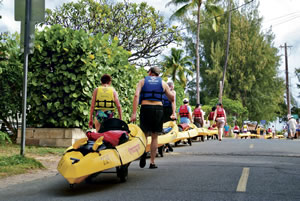A Solution For Kailua Kayak Issue?

Kayak renters head down to Kailua beach last Thursday. Nathalie Walker photo
It’s been a hot issue in Kailua for nearly a decade, but it wasn’t until the summer of 2006 when it really started to heat up. After much debate, the Kailua Neighborhood Board voted to restrict commercial activities at Kailua Beach. The ban would prohibit rentals of kayaks, kiteboards and surfboards at the beach, but would not restrict beachgoers from doing such activities as long as they brought the items on their own.
Vocal community members feared Kailua’s oldstyle residential community was turning into a tourist destination and many wanted to stop that from happening. Longtime board member Chuck Prentiss said at the time, “We have to live our lives here, and we don’t want it to turn into a Disneyland.”
Business owners meantime voiced the need for balance, and expressed concerns that a ban of all commercial use of the beach park was unreasonable and would hurt the local economy.
Former Department of Land and Resources director Peter Young agreed and said a ban would drive people away from Kailua. He also reminded board members that visitors had changed: “It’s no longer the escapism it used to be where people want to come and simply sit on a beach and enjoy the sun. Now they want some activity.”
The board’s recommendations to the city and state would not get very far, and commercial use of Kailua Beach would continue with little compromise.
Fast forward to January 2012, when Bill 5 sponsored by City Councilman Ikaika Anderson makes its way to the full Council for a vote, and passes by a 9-0 margin. Under the measure, commercial activities would be restricted from Lanikai to Castle Point, which includes Kalama and Kailua beach parks. The restriction would begin at 1 p.m. Saturday and continue through 6:30 a.m. Monday. There would be an exemption for the film industry with a proper permit.
“Makes it very easy to enforce. Any commercial activities going on during those times, the police department can come out, issue a citation and have the offender get out of the park,” says Anderson.
“We’re thrilled that now we know we can call 911 if our access is blocked and that the police can come and do something about it,” added Ann Dewey of Lanikai Community Association.
Residents say it is the compromise they’ve long searched for. Supporters feel the measure will bring balance back to Kailua, ease traffic in the area and open up valuable parking stalls. “They’re taking up parking that should be reserved for residents and visitors who choose to come to Kailua Beach Park,” says longtime Kailua resident Lisa Cates of kayak companies and tour buses.
“My friends were unable to walk down the right of way with their stroller or their own kayak because the right of way is blocked by the commercial activity,” says Dewey.
But the same concerns that were raised nearly six years ago still exist. “My major concern is that we might send a wrong signal to the visitors who want to come to Hawaii,” says City Councilman Romy Cachola.
And companies that rent kayaks and other watercraft fear the proposed changes could have an enormous impact on business.
“We employ more than 50 members of the community, and hopefully we can continue to do that,” says Egmar Klemmer of Kailua Sailboards and Kayaks.
But after all these years, something had to give.
Truth is more kayaks were surfacing at Kailua and a majority of these users were poorly supervised, if at all. I can’t tell you how many times local residents have helped distressed kayakers back to shore from the Mokuluas or even nearby Flat Island.
And watching these inexperienced users come ashore in surf is always nervewracking, especially when children are swimming with a runaway plastic kayak is heading toward them.
Is the ban extreme? Perhaps. Will it hurt tourism? Only time will tell. Yes, visitors want adventure, but they also want to enjoy the beauty of Kailua. Removing commercial kayaks from the beaches on Saturdays and Sundays will not keep them away. If the bill becomes law, it would take effect on July 1, right in time for the peak of summer.





